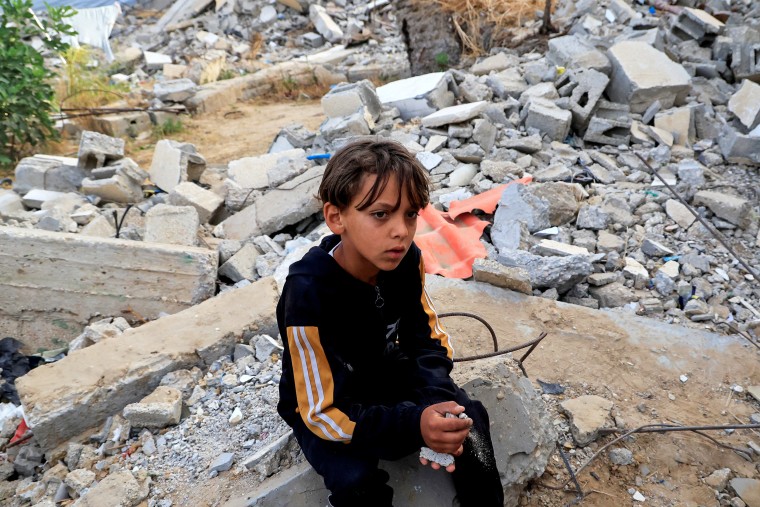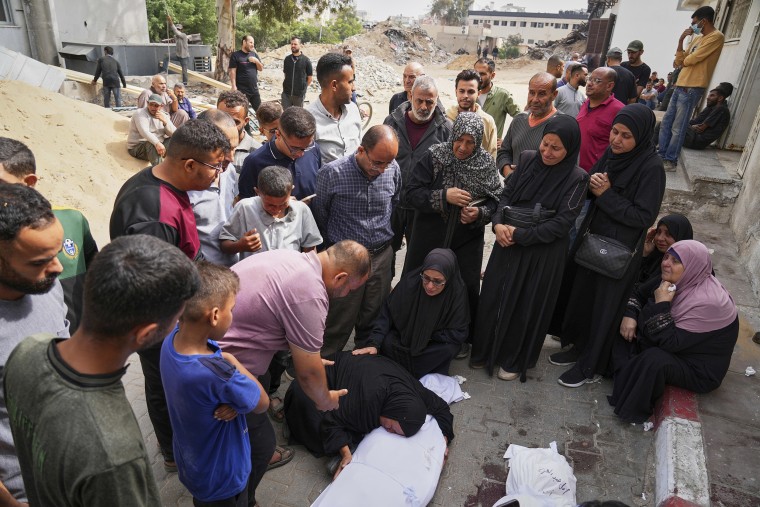Israeli Prime Minister Benjamin Netanyahu said Monday that his country’s military was “moving toward full control” of the Gaza Strip as its intensifying air strikes and ground operation there killed dozens more people overnight.
Israeli bombardment had killed more than 300 people in the 72 hours to early Monday, the health authority in Gaza said. Children were among the dead after a wave of airstrikes in the southern city of Khan Younis that came even after Netanyahu said his forces would allow in limited amounts of food to avoid the risk of famine.
In a statement Monday, Gaza’s Hamas-run government urged the international community to pressure Israel to allow the entry of at least 500 aid trucks and 50 fuel trucks daily into the strip, adding that “signs of famine and humanitarian collapse are worsening at a terrifying rate.”
That came after the Israeli government announced plans Sunday that, if actioned, would end its 11-week aid blockade of Gaza and allow in “basic” quantities of food. Netanyahu doubled down Monday on his decision, responding on Telegram to critics from Israel’s political right wing.

“There is a lot of criticism from the right this morning regarding the humanitarian issue — and that’s understandable. But it’s important to know the facts,” he said, adding that “we must avoid a situation of famine, both in substance and in perception.”
“If there is famine,” he added, “we will lose international support and won’t be able to achieve victory.”
That decision came even as Israel moved ahead with plans for a new ground offensive, dubbed ‘Chariots of Gideon,’ after Israel’s Security Cabinet earlier this month unanimously approved plans to seize all of the Gaza Strip.
It was in his statement Monday that Netanyahu said that “there is intensive and large-scale military activity in Gaza” and that the Israeli military was “moving toward full control of the entire Strip.”
Israel says the operation is aimed at defeating Hamas and ensuring the return of the remaining hostages of the 250 taken captive during the Hamas-led terror attacks in Israel on Oct. 7, 2023, during which around 1,200 people were killed.
The ensuing war in Gaza has killed more than 53,000 people in the enclave, Palestinian health officials say. That death toll is still rising.
Those killed in airstrikes added to what has become one of the deadliest weeks of the conflict since a ceasefire between Israel and Hamas collapsed in March.
In a statement Monday, Hamas said that the Israeli military had launched “hundreds of highly destructive shells, missiles, and bombs daily, targeting residential neighborhoods and densely populated civilian areas.”
The Israel Defense Forces said Monday that it had struck 160 of what it called “terror targets” in the past 24 hours.
The attacks come as international aid groups have repeatedly warned in recent weeks of the risk of famine in Gaza after the Israeli government maintained a complete aid blockade since March 2.

“We’re in a race against time to avoid famine,” the United Nations’ World Food Programme said in an X post Sunday, in which it urged the international community to “act urgently to get aid flowing again.”
Those warnings have sparked alarm among even Israel’s closest allies, with President Donald Trump telling reporters on Friday that “a lot of people are starving” in Gaza.
The United Nations said Monday 92% of homes in Gaza have already been destroyed or damaged in a post on X, adding that “countless people have been displaced multiple times, and shelter is scarce.”
In footage captured Sunday by NBC News’ crew on the ground, Israeli missiles struck a cluster of tents sheltering displaced families in the Al-Mawasi area, west of Khan Younis in the southern Gaza Strip, killing at least 40 people and injuring dozens of others.
“I brought five charred bodies to Nasser Hospital, but many more are still by the tents—we couldn’t reach them because of the flames,” Jaafar Ezzedine, a civil defense medic, told NBC News.
Warda Waleed Al-Shaer, a displaced woman from Rafah, told NBC News that her brother, his wife and their children had been killed in the attacks. “Why? What happened? How can I live with losing all of them at once?” she said.
Following Israel’s announcement to allow humanitarian assistance into Gaza, Reuters reported that aid trucks were seen lining up Monday in Egypt’s northern Sinai city of Arish, apparently waiting to enter Gaza through its southern Rafah Crossing.